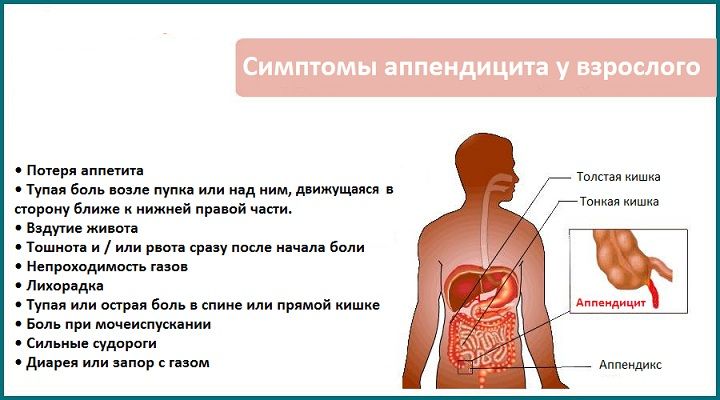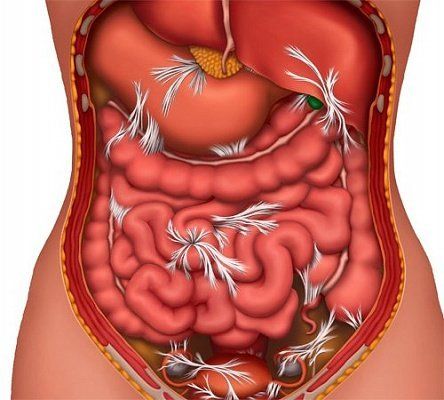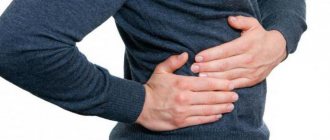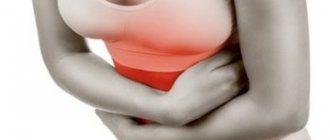Every person should know what to do if their stomach hurts and they feel sick. Such conditions have occurred at least once in every person’s life, from infants to the elderly. When diagnosing at home, it is necessary to take into account not only the nature of the pain (sharp, dull, aching), but also its location. This will help determine which organ is experiencing problems. If the patient calls the doctor because of acute pain, then until the doctor arrives, you should not take any medications. Otherwise, the clinical picture of the disease will be erased, and it will be very difficult for the doctor to establish the cause of the deterioration in health.
Causes
- Unbalanced, often unhealthy diet, causing constipation or diarrhea. It is necessary to prevent cases of overeating, otherwise food indigestion may occur.
- Severe pain in the stomach is caused by a viral infection, when in addition to cramps, severe nausea, vomiting and diarrhea are possible.
- Physiological overstrain. Severe pain is disturbing if a person is tired, constantly nervous, or in a state of chronic fatigue.
- Very severe stomach pain is caused by chronic gastritis, especially during exacerbation and after eating rough food.
- Inflammation of the appendix causes a condition where the entire abdomen cuts, nothing can be done because of the unbearable pain. When it does not go away, surgery is necessary.
- Stomach pain is caused by a peptic ulcer or malignant tumor.
- Pain in the stomach area is possible due to infectious diseases inside the respiratory system - sore throat or bronchitis.
- Be sure to visit a doctor when your stomach hurts severely for no apparent reason, and the symptom occurs suddenly. If an infant experiences pain, it is necessary to further examine him, since he may have individual intolerance to the enzyme lactose.
Poisoning
In case of poisoning, the severity of pain symptoms can vary greatly: from mild discomfort to severe pain. The nature of such signs depends only on the degree of intoxication accumulated inside the body. Painful symptoms appear incredibly quickly (they are quite possible as early as half an hour after poisoning) or after a longer period (up to two days).
Typically, such signs appear a couple of hours after intoxication. In addition to stomach pain, they become:
- diarrhea;
- vomiting after attacks of nausea;
- headache;
- general weakness.
Pathologies of other organs
If stomach pains appear, they can be provoked by diseases of various internal organs. Most often these are:
- pancreatitis;
- appendicitis;
- disturbances in the natural functioning of the intestines;
- cardiovascular problems.
Alcohol
Although alcoholic drinks have a negative effect on all digestive organs, the stomach is the first to suffer. Since alcohol is a poison, its components penetrate through the walls of the stomach into the blood, which carries them to all other organs.
Simultaneously with damage to the gastric walls, destruction of the blood vessels of the circulatory system occurs, accompanied by pain immediately after a person decides to drink alcohol. Even small, however, regular doses of alcohol often provoke severe pain. Initially, the stomach begins to intensively produce mucus to protect its walls, but then this process stops. Strong drinks cause burns to the mucous layer.
When a person does not stop drinking alcohol, he develops alcohol-type gastritis, which can develop into an ulcer. To subsequently restore the natural functioning of the organ requires spending a lot of time and effort.
Stomach pain in pregnant women
Being in a piquant state, women are subject to exacerbations of existing chronic diseases. They often have stomach problems. The situation is aggravated by the fact that they are prohibited from taking medications during this time. Often painful attacks are provoked by the growing uterus.
Because of this, pregnant women should eat small portions of food. Since folk remedies can do more harm than good at this time, it is better to abandon them.
Night pain
There are situations when stomach pain haunts a person only at night, while there is no pain during the day. Such behavior of the body indicates an inflammatory process in the walls of the organ. Food entering the stomach during the day somewhat evens out the situation, but an empty organ exacerbates inflammation. Immediate medical consultation is required. While waiting for the examination, you should numb the attacks, for which you should take medicine.
Warning signs
Severe abdominal pain and vomiting may occur with an ectopic pregnancy
Acute pancreatitis and cholecystitis, appendicitis, strangulated umbilical hernia, adhesions causing intestinal obstruction are dangerous conditions that require emergency care. Vomiting and sharp abdominal pain occur with ectopic pregnancy, which is dangerous due to internal bleeding and death of the patient.
Abdominal pain does not stop after vomiting - this means there is an inflammatory disease of the gastrointestinal tract. In people who suffer from a chronic form of pancreatitis or cholecystitis, periodic exacerbations are possible if the doctor’s recommendations are not followed. Symptoms characteristic of this condition:
- increased body temperature;
- lack of appetite;
- vomit;
- flatulence, diarrhea or constipation;
- sharp girdle pain.
A mild attack can be controlled by fasting for 2–3 days, as well as by taking antibiotics and anti-inflammatory drugs. In a severe situation, with obstruction of the ducts and necrotic processes in the internal organs, surgery is necessary.
Appendicitis

Symptoms of appendicitis
Sharp pain in the right lower abdomen, nausea or vomiting are a sign of inflammation of appendicitis. In this situation, there is only one way out - surgery to remove the appendix. If surgical intervention is not performed in time, a rupture may occur and pus will enter the peritoneum, peritonitis and blood poisoning will begin, after which it will be difficult to save the person.
Hernia and adhesions

Abdominal adhesions
A strangulated umbilical hernia and adhesions in the abdominal cavity cause intestinal obstruction. In this case, uncontrollable vomiting begins, first with gastric and then intestinal contents, defecation stops, cold sweat is released, and symptoms of intoxication are present.
Both conditions are life-threatening. The person must be operated on urgently so that intestinal necrosis does not begin and its contents do not enter the peritoneum. If you miss the moment of pain, it subsequently subsides, and the patient begins to have peritonitis.
First aid
- Starvation. To ensure that the body receives the necessary elements, you should eat only liquid food. During this period, it is recommended to only drink water. Carbonated drinks are prohibited. If you experience spasmodic pain, you should avoid eating altogether.
- Casual clothes. When stomach pain is accompanied by bloating of the peritoneum, you should not wear tight clothing. Only after getting rid of the pathology will it be possible to return to your usual wardrobe.
- Warm-up procedures. Place something warm (a heating pad) on your stomach. This should make things easier. However, if the pain lasts for a long time, you should definitely visit a doctor.
- Peace. It is advisable to relax in a horizontal position, take your mind off the discomfort, and listen to some soothing music.
- Taking an antacid. If pain occurs on an empty stomach, it is due to the influence of stomach acid. An antacid will help in such a situation. This category of medications reduces acidity, although it has undesirable effects. When a pain symptom is accompanied by diarrhea, medications with a high calcium content should be taken. In a situation with constipation, an antacid that contains more magnesium should be preferred. Since medications in this group are addictive, they should be used only in emergency situations. You should also understand that by taking acid-reducing medications, you may miss the main pathology.
- Use of antihistamines. Similar to antacids, these products should not be used frequently. If your stomach is swollen, belching can help, which can be caused by medications such as Alka-Seltzer.
First aid for stomach pain
If your stomach hurts and you feel nauseous, you should not self-medicate. There is no need to take painkillers so that the clinical picture of the disease is not erased before the doctor arrives. It is necessary to lie down in bed or take a sitting position without making sudden movements. You should not eat any food, as this may cause vomiting. You can only drink boiled water or pure mineral water without gas. If the pain is very severe, you can take a drug that relieves spasms. Under no circumstances should you place a heating pad on your stomach, as this can promote the spread of inflammation. If the pain is caused by a bruise, cold may be applied to the area of the bruise.
Folk remedies
In order not to pollute the body with all kinds of chemicals, it is worth taking a closer look at folk recipes. However, get your doctor's approval first. The following products have been found effective against stomach pain:
- Plum.
- Gooseberry. You need to make a water infusion, bring it to a boil, and then cook for a quarter of an hour. Drink half a glass every 3 hours.
- Blueberry or currant tea.
- Chamomile.
- Vegetable oil (should be washed down with chamomile tea).
Sometimes stomach pain is caused by prolonged use of antibiotics. There is a very effective remedy that helps a person in such a situation: immediately after the onset of pain, you need to swallow three peas of black pepper, and then wash it down with a glass of water. The pain caused by antibiotic treatment will certainly disappear after half an hour.
You can also get rid of various types of pain in different ways, using propolis, cabbage juice (sour cabbage), honey. However, when treatment does not relieve discomfort, drug treatment cannot be avoided.
Why does my head, stomach and nausea hurt?
The appearance of several symptoms in a person at the same time indicates serious malfunctions in the functioning of systems and organs. It happens that the localization of sensations does not necessarily indicate that the problem is in the same area. For example, symptoms such as headache and nausea are characteristic of a high degree of intoxication of the body. Abdominal discomfort may be a consequence of vomiting.

Addressing problems separately with medications will only provide temporary relief. Only by understanding the cause of headaches and other symptoms can you choose the optimal treatment option that will give lasting results.
You can learn more about the possible causes of nausea together with cephalgia here.
Asthenovegetative syndrome
The autonomic nervous system is responsible for the internal organs performing their functions. Violation of the process at one of the stages leads to failures in the operation of life support systems. This is facilitated by hormonal changes, congenital or acquired ailments, and deficiency of mineral elements. The clinical picture depends on the specifics of the case, but most often patients complain of nausea, stomach and headache pain, and slight physical stress leads to increased heart rate. Depending on the characteristics of the course of the disease, these symptoms are accompanied by weakness, fatigue, excessive sweating, darkening of the eyes and fainting.
Food poisoning
Discomfort in the stomach is often a consequence of eating low-quality food. Problems can be caused by poor heat treatment of the dish, an abundance of additives in it, an expired product, or violation of its storage conditions.
The following symptoms are typical for food poisoning:
- severe headache, nausea, fever;
- abdominal pain appears;
- the patient vomits, after which relief may occur;
- the patient feels dizzy and thirsty;
- a decrease in blood pressure is often observed;
- after some time, signs of stool disorder appear.

The condition can develop not only in response to food consumption. Drug poisoning follows approximately the same scenario, but the symptoms are often more pronounced. Sometimes there are additional signs of an emergency, depending on the type of medication taken.
You can learn more about the relationship between cephalalgia and poisoning here.
Nausea and pulling in the lower abdomen during pregnancy
In the first trimester, women often experience nausea and vomiting - signs of toxicosis.
Cephalgia becomes the result of hormonal changes in the body; it has a weak or moderate degree of severity. Pain in the abdomen looks like cramps. It occurs as a result of fertilization and attachment of the egg. If there is slight weakness and nausea, and the severity of other symptoms does not disturb you from the usual rhythm of life, there is no reason to worry. Otherwise, you should consult a gynecologist.
You will learn about the causes of cephalalgia in the first trimester of pregnancy here.
Toxic infection
Nausea with vomiting, abdominal cramps, headache and fever are symptoms of toxic poisoning. The clinical picture develops rapidly, soon after the poisons enter the body. After some time, this is accompanied by intestinal problems - flatulence, diarrhea, bloating. Signs of intoxication can be caused by eating poorly washed vegetables and fruits, improperly sealed canned goods, failure to comply with personal hygiene rules, working with chemicals, or ignoring the rules for handling household chemicals.
You can learn about other causes of diarrhea and headache here.
Premenstrual syndrome

Find out more about menstrual migraines here.
Against this background, the general condition worsens. A woman feels nausea, dizziness, weakness, irritability. Unpleasant sensations in the abdomen and other symptoms usually disappear in the first days of menstruation, but sometimes persist until the last day of the cycle. Such symptoms are usually easily relieved by taking antispasmodics, relaxation and sleep.
Recommendations
Any opportunity to get sick radically disrupts a person’s plans, preventing him from feeling comfortable. Several simple preventive measures have been developed to achieve a situation where the stomach does not cause problems:
- ensure the cleanliness of the products you eat and your own hands;
- Healthy food;
- give up alcohol and smoking;
- consume foods rich in minerals;
- Avoid frequent use of medications.
Chronic pathology of the abdominal organs
First of all, this group of causes should include functional diseases of the gastrointestinal tract. These include:
- Biliary dyskinesia , characterized by impaired motility of the gallbladder. Clinically, it manifests itself as attacks of pain in the right hypochondrium, nausea and loss of appetite, but examination does not reveal any organic changes.
- Functional dyspepsia is a broad concept that unites all symptoms of the upper gastrointestinal tract that do not have any underlying organic pathology. These manifestations include pain in the pit of the stomach, a feeling of rapid satiety, heaviness in the stomach, and belching.
Nausea is a frequent companion to peptic ulcers of the stomach and duodenum. These diseases should be suspected when pain appears in the upper abdominal cavity in connection with eating, heartburn and discomfort.
Other diseases include:
- Chronic pancreatitis;
- Chronic cholecystitis;
- Urolithiasis;
- Endometriosis.
Food poisoning
If you feel nauseous and have a stomach ache immediately after eating, food poisoning is most likely developing. In most cases, people do not need to go to the hospital: it is enough to drink sorbents and a large amount of liquid.
In fact, bacteria called salmonella, E. coli, and enteroviruses are responsible for the poisoning. Signs of food poisoning can be recognized within a few hours after eating contaminated food. Symptoms usually appear simultaneously, and the patient's condition worsens hourly.
It is necessary to take sorbents if:
- severe stomach pain;
- feeling nauseous;
- vomiting developed;
- diarrhea began, especially with blood or mucus;
- cramps are felt in the abdomen;
- general weakness developed sharply;
- loss of appetite;
- the temperature has risen;
- muscle pain is observed.
In most cases, all of the above symptoms will go away in a few days, and the body will fully recover.
Symptoms of diseases in the stomach
A person’s condition of stomach pain and nausea may be accompanied by other accompanying symptoms and occur with varying frequency. Sometimes such signs appear only once, indicating minor inflammatory processes or errors in nutrition. Cases where the feeling of nausea or pain is constantly present are manifestations of serious diseases, so such signals should not be ignored.
Main associated symptoms:
- Poor appetite or loss of appetite.
- Regular feeling of heartburn.
- An unpleasant taste in the mouth.
- Vomit.
If any of the listed symptoms appear along with nausea in the stomach and pain, there is no need to postpone a visit to a specialist.








